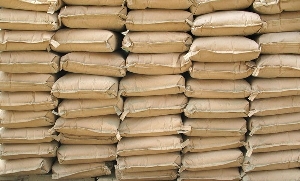- Home - News
- TWI News | TV
- Polls
- Year In Review
- News Archive
- Crime & Punishment
- Politics
- Regional
- Editorial
- Health
- Ghanaians Abroad
- Tabloid
- Africa
- Religion
- Election 2020
- Coronavirus
- News Videos | TV
- Photo Archives
- News Headlines
- Press Release
General News of Thursday, 6 August 2009
Source: Washington Post
Recession in the West Cuts Off An Economic Pipeline in Ghana
ADUASE, Ghana -- When the U.S. housing crash triggered economic chain reactions around the world, one ended in a lush forest near this village, where on a recent day Emmanuel Awatey was tapping his machete on a log that he very much wanted to chop up.
In previous years, Awatey would have done just that, and then carried the wood on his head to the red dirt road nearby. A truck there would have ferried it three hours to the Tekura handicrafts workshop in Accra, Ghana's capital, where it might have been carved into a stool by an artisan, then shipped duty-free to the United States, then sold at Cost Plus World Market for display in an American home.
But the U.S. housing market and the global economy collapsed. And so has work for Awatey, the carvers and others working what had been a thriving pipeline from Ghanaian rainforest to American retail.
"If work comes tomorrow, we will head to the forest," said Awatey, 44, a sinewy subsistence farmer who, like others in his village, used to make as much as $25 a week chopping and carrying cedrela wood for Tekura. "But it all depends on the ones who bring the work."
'Wiping Out' the Vulnerable
The financial crisis has checked demand for African commodities, slowing the continent's economies. Less visibly, however, it has also stunted small African exporters who had become fledgling trade success stories -- and micro-level poverty busters -- in a region often associated with gloom.
In many cases, these exporters were lifted by a decade-old U.S. program meant to promote economic development through duty-free access to American markets. Now a U.S.-triggered meltdown is erasing many of the gains.
"We had small- and medium-sized businesses that had so much hope. They invested capital, they took loans. And the rug has been pulled out from under them," said Rosa Whitaker, a former assistant U.S. trade representative for Africa and architect of the program, the African Growth and Opportunity Act, or AGOA. "It's wiping out some of the world's most vulnerable people."
In the first quarter of this year, AGOA exports from sub-Saharan Africa to the United States, including oil, plummeted 59 percent, while non-oil exports such as textiles and agricultural products dropped 22 percent.
Secretary of State Hillary Rodham Clinton is set to discuss the program, which expires in 2015, at a forum Wednesday in Kenya as part of her seven-country trip to Africa.
Ghana's overall economy has remained steady because of strong prices for its cocoa and gold. But exports under AGOA dropped by more than one-third in 2008, and fell 86 percent, to $5.2 million, in the first five months of this year. While much of the plunge came from a fall in exports of foreign oil processed in Ghana, it also reverberated through particleboard factories, mango farms and jewelry studios.
As in many sub-Saharan countries, Ghanaian textile and apparel exporters have been particularly hard-hit, including some that U.S. officials once touted as AGOA poster children. Among them is Prosper Adabla's formerly humming factory near Accra, which manufactured tube socks for export.
An end to worldwide quotas on Chinese apparel exports in 2005 brought stiff competition. Two years later, Adabla's U.S. partner went bankrupt. Adabla shut his factory last summer, leaving $1 million worth of socks unsold and 1,000 workers jobless.
"The demand has dried up, number one. Number two, the partners have either gone bankrupt or are no longer in business or have decided to buy from China," Adabla said. "AGOA gave us an option . . . but if you can't sell your product, it's useless."
Few Ready for Tough Times
Ghana's small handicrafts industry, which was already expanding because of free-market reforms meant to grow nontraditional exports, got an additional boost from the program and then another from a booming U.S. housing and consumer market.
Earlier this decade, big American retailers such as Pier 1, World Market and TJ Maxx were snatching up handmade candleholders and baskets from Ghana. When Target ordered hundreds of thousands of dollars worth of goods from Tekura and other enterprises in 2004, hundreds of rural carvers won work chiseling African art for American abodes.
But most of the orders dried up by the end of 2007. Spokesmen for Pier 1, TJ Maxx and World Market did not respond to or declined requests for comment, but retail analysts say the explanation is evident.
In an era when retailers are trimming inventories, cutting price points and closing stores, African accessories count as luxuries, said Nick McCoy, an analyst with RetailForward in Ohio.
Robert Ellis, whose Fritete African Art Works was the forerunner of Ghana's handicrafts exporters, said cracks in the industry began showing before U.S. and world financial woes. Asian factories were making cheaper copies. Ghanaian artisans were not updating their work often enough. And when demand fell, he said, few had built a foundation to get them through tough times.
Ellis, who proudly shows off a 2005 Target ad touting "AFRICAN DESIGNS 14.99 -- 79.99" that includes his rustic wood table, watched his export sales drop from $305,000 in 2007 to $70,000 in 2008. Six muscular carvers now toil in his wood-strewn workshop, down from 150 in December.
He has sold property and paid off debts, and he says he thinks he can survive the crash. Smaller Ghanaian producers, he said, "will need a miracle."
AGOA has never become a silver bullet for micro-enterprise in Africa, whose share of global trade is just 2 percent. Ninety percent of exports under the program still come from oil, though non-oil exports have tripled since 2001.
Small businesses complain about the program's byzantine guidelines and say U.S.-provided training is not tailored enough. While some African governments saw the program as an opportunity and created export-friendly policies, others ignored it. More generally, poor roads and power supplies hinder commerce, and little companies cannot afford the 30 percent interest rates that African banks typically slap on long-term business loans.
In Tekura's quiet offices on the muddy outskirts of Accra, Josephine and Kweku Forson said they are waiting out the storm. Their sleek stools and masks -- all made from trees cut as part of government reforestation programs -- are gathering dust. Sales fell in half from 2007 to 2008 and are on track to fall another 60 percent this year.
In the sawdust-filled workshop on a recent day, Kwabena Appiah, 25, was one of just 10 artisans on duty. He was lucky: The Forsons said that they had regretfully let go more than 100 workers, and that they were especially worried about the woodcutters in the forest.
Out in Aduase, a tiny settlement where goats scurry about, those 20 or so woodcutters were once again getting by on their cassava and plantains. The clothes, haircuts and even rat poison they purchased with the extra income were on hold, Awatey said.
The woodcutters said they had no idea where the trees they chopped ended up after they left Ghana. But they said they knew why the wood was staying put for now.
"Because of the recession," said 32-year-old Paulina Ohenewaa, "there are economic problems everywhere in the world."










